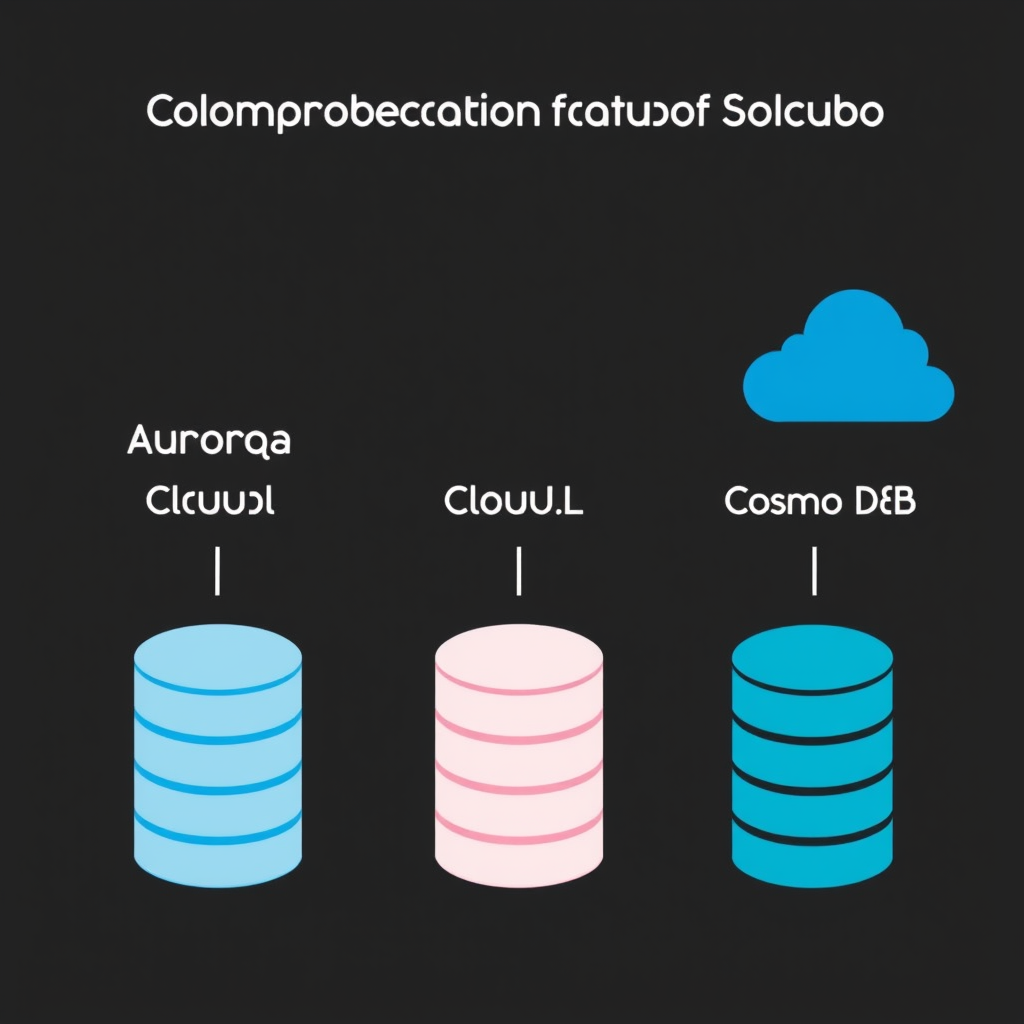
Aurora vs. Cloud SQL vs. Cosmos DB: Choosing the Right Cloud Database for Your Needs
In today’s cloud-centric world, selecting the appropriate database solution is critical for performance, scalability, and cost-effectiveness. Amazon Aurora, Google Cloud SQL, and Azure Cosmos DB are three prominent cloud database offerings, each with distinct strengths and use cases. This article provides a comprehensive comparison to help you make an informed decision for your organization. As we at Doterb firmly believe, “A website is not just a display it’s your company’s digital trust representation,” and the underlying database plays a crucial role in ensuring that trust is well-placed.
Table of Contents
Introduction
Cloud databases offer numerous advantages over traditional on-premises databases, including reduced operational overhead, increased scalability, and global availability. However, choosing the right cloud database can be a complex task. This article aims to demystify the selection process by comparing Amazon Aurora, Google Cloud SQL, and Azure Cosmos DB across key criteria.
Overview of Cloud Databases
Let’s briefly introduce each cloud database before diving into a detailed comparison.
Amazon Aurora
Amazon Aurora is a fully managed, MySQL- and PostgreSQL-compatible relational database engine. It’s known for its high performance, availability, and compatibility with open-source database systems. Aurora boasts significantly improved performance compared to standard MySQL and PostgreSQL without requiring major code changes.
Google Cloud SQL
Google Cloud SQL is a fully managed database service that offers support for MySQL, PostgreSQL, and SQL Server. It provides easy setup, maintenance, and administration of relational databases in the Google Cloud Platform (GCP). Cloud SQL is suitable for a wide range of applications, from small-scale web applications to enterprise-grade systems.
Azure Cosmos DB
Azure Cosmos DB is a globally distributed, multi-model database service. It supports various data models, including document, key-value, graph, and column-family. Cosmos DB is designed for applications that require low latency, high availability, and global scale, particularly those dealing with frequently changing data.
Comparative Analysis
Now, let’s compare these three cloud databases across several critical factors.
Data Model
- Aurora & Cloud SQL: Primarily relational (MySQL, PostgreSQL, SQL Server)
- Cosmos DB: Multi-model (Document, Key-Value, Graph, Column-Family)
Choose Aurora or Cloud SQL if you need a traditional relational database. Opt for Cosmos DB if you require a NoSQL database or need to support multiple data models within a single database.
Scalability and Performance
- Aurora: Excellent scalability with read replicas and automatic storage scaling. Optimized for performance.
- Cloud SQL: Good scalability, especially with read replicas. Performance is generally good, but may not match Aurora in specific scenarios.
- Cosmos DB: Built for massive scalability and low latency at a global scale. Offers guaranteed single-digit millisecond read and write latencies at the 99th percentile.
Cosmos DB excels in applications requiring global scale and low latency. Aurora offers strong performance for relational workloads. Cloud SQL provides a balance of scalability and ease of use.
Availability and Durability
- Aurora: High availability with automatic failover to read replicas. Data is replicated across multiple Availability Zones (AZs).
- Cloud SQL: High availability options with regional and multi-AZ configurations. Data replication ensures durability.
- Cosmos DB: Industry-leading availability with the ability to configure multiple write regions for global distribution.
All three databases offer strong availability and durability. Cosmos DB provides the highest level of availability, especially when configured for global distribution.
Pricing Model
- Aurora: Pay-as-you-go based on instance size, storage usage, and I/O operations.
- Cloud SQL: Pay-as-you-go based on instance size, storage usage, and network traffic.
- Cosmos DB: Provisioned throughput (RU/s) based pricing. Requires careful capacity planning to optimize costs. Also offers serverless option.
Aurora and Cloud SQL have similar pay-as-you-go models. Cosmos DB’s RU/s-based pricing can be complex but allows for precise control over performance and cost. Consider the total cost of ownership, including management and maintenance, when comparing pricing.
Management and Administration
- Aurora: Fully managed service with automated patching, backups, and recovery.
- Cloud SQL: Fully managed service with automated patching, backups, and recovery.
- Cosmos DB: Fully managed service with automated patching, backups, and global distribution management.
All three databases are fully managed, significantly reducing the operational burden on your IT team.
Ideal Use Cases
- Aurora: Web applications, e-commerce platforms, content management systems (CMS) requiring high performance and scalability with MySQL or PostgreSQL compatibility.
- Cloud SQL: Web applications, mobile app backends, business intelligence applications requiring relational database functionality.
- Cosmos DB: IoT applications, gaming platforms, personalization engines, mobile applications requiring global scale, low latency, and flexible data modeling.
Conclusion
Choosing the right cloud database depends on your specific requirements. Amazon Aurora is a strong choice for relational workloads requiring high performance. Google Cloud SQL offers a balanced approach to relational database management. Azure Cosmos DB is ideal for applications that demand global scale, low latency, and flexible data modeling. Carefully consider your data model, scalability needs, availability requirements, and budget before making a decision.
FAQ
Q: Which database is easiest to migrate to from an on-premises MySQL database?
A: Amazon Aurora and Google Cloud SQL are both excellent choices for migrating from an on-premises MySQL database due to their MySQL compatibility. Aurora often boasts better performance after migration with minimal code changes.
Q: What if I need to store unstructured data?
A: Azure Cosmos DB is the best option for storing unstructured data due to its multi-model support, particularly its document database capabilities.
Q: Which database is most suitable for globally distributed applications?
A: Azure Cosmos DB is specifically designed for globally distributed applications with its multi-region writes and low-latency guarantees across the globe. While Aurora and Cloud SQL can be configured for regional availability, they don’t offer the same global scale and multi-master capabilities as Cosmos DB.
Next Steps
Selecting the right database is a crucial step in building a successful and scalable application. Understanding the strengths and weaknesses of each option will allow you to make a more informed decision. If your business needs an efficient website, system integration, or digital transformation services, contact the Doterb team today. We can help you assess your requirements and implement the ideal cloud database solution for your specific needs.
